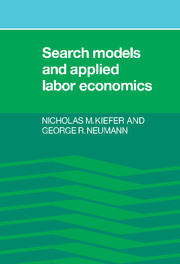Book contents
- Frontmatter
- Contents
- Preface
- 1 Introduction
- Part I Wages, reservation wages, and duration
- Part II Continuous-time models of duration
- Part III Applications
- Part IV Mobility and contracting
- 11 Employment risk and labor market diversification
- 12 A proposition and an example in the theory of job search with hours constraints
- 13 Interfirm mobility and earnings
- 14 Methods for analyzing employment contracts and other agreements
- Index
13 - Interfirm mobility and earnings
Published online by Cambridge University Press: 06 October 2009
- Frontmatter
- Contents
- Preface
- 1 Introduction
- Part I Wages, reservation wages, and duration
- Part II Continuous-time models of duration
- Part III Applications
- Part IV Mobility and contracting
- 11 Employment risk and labor market diversification
- 12 A proposition and an example in the theory of job search with hours constraints
- 13 Interfirm mobility and earnings
- 14 Methods for analyzing employment contracts and other agreements
- Index
Summary
Cross-section studies invariably show a positive and usually concave relation between earnings and labor market experience. The pervasiveness and stability of this pattern has generated a substantial amount of theoretical investigation. One economic explanation of the pattern is that it is a reflection of investment in job-specific capital. The theoretical literature on mobility focuses on three specific versions of job-specific investment: job search, job matching, and on-the-job training. According to the first version, an individual worker's wage is stationary on a given job but differs across jobs. Information about the location and nature of jobs is imperfect and takes time to acquire. Hence, a worker earning a higher wage relative to alternatives is less likely to quit. In the second version, a worker's productivity is initially uncertain, but the degree of uncertainty diminishes with experience on the job as a consequence of repeated observations. “Good” matches, those on which the worker experiences wage growth, endure. In the third and best known version of the job-specific capital hypothesis, a worker acquires job-specific skills through learning and training on the job. Consequently, the worker's wage increases with job tenure relative to offers on alternative jobs, which implies that the propensity to separate diminishes.
- Type
- Chapter
- Information
- Search Models and Applied Labor Economics , pp. 247 - 283Publisher: Cambridge University PressPrint publication year: 1989



